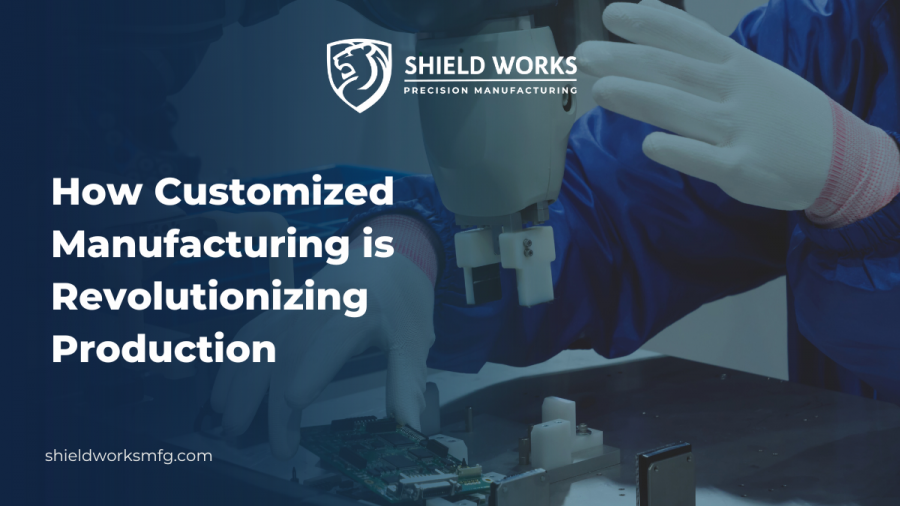Posts Tagged ‘Customized Manufacturing’
How Customized Manufacturing Drives Precision and Efficiency

In the world of manufacturing, precision and efficiency are two of the most critical factors in producing high-quality products. Many businesses, both large and small, are turning to customized manufacturing solutions to meet their specific needs and improve their production processes. In this blog, we explore how customized manufacturing in China can help companies achieve unparalleled precision and efficiency, leading to better products and higher profitability.
What is Customized Manufacturing?
Customized manufacturing refers to the process of designing and producing goods based on the specific requirements of a customer. Unlike mass production, which relies on standard designs and large batches, customized manufacturing involves tailoring every step of the production process—from design to materials to production methods—to meet the unique needs of the customer.
Customized manufacturing allows companies to produce products that are not only aligned with their vision but also optimized for functionality, quality, and cost-efficiency. This tailored approach ensures that the final product meets or exceeds industry standards while also fulfilling specific business goals, whether that be market differentiation, performance, or even sustainability.
Why Choose Customized Manufacturing?
Many companies opt for customized manufacturing because it allows them to stand out in competitive markets. By offering products that are specifically designed for a target audience or designed to solve a particular problem, businesses can gain a competitive edge.
Moreover, customized manufacturing can lead to significant cost savings. By using more efficient processes and materials, companies can minimize waste and reduce overall production costs. Additionally, the ability to customize products can allow businesses to control the quality of every component, ensuring consistency and reliability throughout production.
The Benefits of Customized Manufacturing in China
Customized manufacturing in China offers several key advantages that can help businesses optimize their production processes and achieve greater efficiency. Here are some of the main benefits:
Precision
One of the key drivers behind the popularity of customized manufacturing in China is its emphasis on precision. Manufacturers in China are equipped with advanced machinery and software that allow them to create components and products with exceptional accuracy. Whether you’re looking for small, intricate parts or large, complex systems, Chinese manufacturers have the technology and skillset to meet those demands.
Efficiency
Another major benefit of customized manufacturing in China is its emphasis on efficiency. China’s robust supply chain networks and streamlined production processes enable manufacturers to complete orders in a timely manner, reducing lead times and minimizing delays. Moreover, the country’s vast labor force ensures that projects are completed quickly without sacrificing quality.
Cost-Effectiveness
China’s lower labor costs, combined with its large-scale manufacturing capabilities, make it a cost-effective option for customized production. Businesses can take advantage of these cost savings without compromising on quality or precision. Additionally, Chinese manufacturers often offer flexible pricing models, which can be adjusted based on production volumes, materials, and other factors, making customized manufacturing in China an appealing option for businesses of all sizes.
Scalability
As businesses grow, so do their production needs. Customized manufacturing in China offers scalability that allows companies to easily increase production volumes without encountering major obstacles. Whether you need a small batch or large-scale production, Chinese manufacturers can adapt their processes to match your needs, ensuring you get the best results no matter the size of the project.
Potential Challenges of Customized Manufacturing in China
Although customized manufacturing in China offers many benefits, it’s not without its challenges. Language barriers, cultural differences, and time zone issues can create misunderstandings. Additionally, navigating the complexities of Chinese regulations and intellectual property protection can be tricky for businesses unfamiliar with the local market.
To mitigate these risks, it’s crucial to work with an experienced sourcing agent or consultant who understands the nuances of Chinese manufacturing.
How to Find the Right Customized Manufacturing Partner in China?
Finding the right customized manufacturing partner in China can be a transformative decision for your business, offering numerous opportunities for cost savings, quality, and innovation. However, navigating the vast landscape of manufacturers can be daunting, especially when seeking a partner who aligns with your unique needs and business objectives.
To make the right choice, it’s important to focus on several key factors. Start by thoroughly assessing potential partners’ expertise, industry experience, and capacity to meet your specific requirements. This includes looking for a partner with a solid track record in producing the type of products you require and the ability to scale production as your business grows. Additionally, communication and transparency are essential to ensure that expectations are aligned and that there are no surprises down the line. Thorough due diligence, including factory visits, checking certifications, and gathering client testimonials, will also help you identify the most reliable partner for a successful long-term collaboration.
If you’re ready to explore customized manufacturing options in China, our team at Shield Works is here to help. Contact us today to discuss your manufacturing project. We’re committed to delivering precision, efficiency, and quality in every product we produce.
How Customized Manufacturing is Revolutionizing Production

In the dynamic landscape of modern industry, the conventional approach to manufacturing is undergoing a profound transformation. The era of mass production, characterized by uniformity and standardization, is making way for a more personalized and agile model – customized manufacturing. This paradigm shift marks a turning point in the way products are conceived, designed, and brought to life on the production floor.
Customized manufacturing represents more than just a departure from the status quo; it embodies a redefinition of the entire product development lifecycle. From the initial conceptualization of a product to its design, and finally, its realization on the production floor, every stage of the manufacturing process is undergoing a metamorphosis. This transformation is not merely a response to changing consumer demands but a proactive strategy to meet the expectations of an increasingly dynamic market. Keep reading to learn more about how the manufacturing technique will reshape the industry and how it can benefit your business.
Understanding Customized Manufacturing
Customized manufacturing, also known as bespoke or custom manufacturing, is changing the game for businesses and consumers alike. Rather than mass-producing generic products, customized manufacturing focuses on creating goods that are tailored to the specific needs and desires of individual customers.
Whether it’s a subtle tweak to an existing design or an entirely new product built from scratch, customized manufacturing is all about that personalized touch. This approach values the uniqueness of every customer and strives to create a product that mirrors their specific specifications and requirements. It could be as simple as a color change or as complex as an intricate, unique design based on a customer’s blueprint.
The Significance of Customized Manufacturing
Why should we sit up and take notice of customized manufacturing? Its importance lies in the numerous advantages it presents. It becomes a game-changer for businesses, propelling them to distinguish themselves in a crowded market by delivering one-of-a-kind products, thus gaining a competitive edge.
Higher Customer Satisfaction
When customers can get exactly what they want, they’re more likely to be satisfied with their purchase. Customized products often have a higher perceived value, as customers feel a sense of accomplishment and uniqueness from their personalized purchases.
Competitive Edge
In a crowded market, offering personalized and diversified options can give businesses a competitive edge. It provides them with the opportunity to differentiate their products from those of their competitors.
Opportunity for Innovation
Customized manufacturing encourages businesses to think outside the box when it comes to product design and development. It opens the door to new ideas and innovations that might not be feasible through traditional manufacturing methods.
Strengthen Product Brand
Customized manufacturing shifts the focus from mass production to personalized products that reflect the individuality of each brand, significantly enhancing product diversity and customer requirements.
Opportunities for Smaller Players
While customized manufacturing may seem like a strategy best suited for large-scale companies, it also offers unique opportunities for smaller players in the market. Smaller businesses can capitalize on their agility and closer customer relationships to create customized offerings that outshine those of larger competitors. With their typically leaner operations, they can implement changes more quickly, reducing the time from idea to execution.
Customized Manufacturing in Various Industries
The beauty of customized manufacturing is that it’s not limited to just one sector: it’s making waves across a wide spectrum of industries. Once a luxury only found in high-end markets, it’s now a common sight, popping up in sectors you might never have imagined. Let’s take a virtual tour.
Automotive Industry
Customized Vehicles: Some manufacturers offer customization options for cars, allowing customers to choose specific features, colors, interiors, and accessories to meet their preferences.
Specialty Vehicles: Production of specialized vehicles like ambulances, fire trucks, or recreational vehicles that are customized based on the intended use.
Consumer Electronics
Customizable Gadgets: Some companies allow customers to personalize their electronic devices, such as smartphones or laptops, by choosing colors, specifications, or design elements.
Furniture Industry
Bespoke Furniture: Customized manufacturing of furniture items, where customers can select materials, dimensions, and designs to match their unique preferences and interior spaces.
3D Printing Industry
Additive Manufacturing: Utilizing 3D printing technology to create customized prototypes, components, or products in various industries, including aerospace, automotive, healthcare, and more.
Promotional Products
Branded Merchandise: Production of promotional items like branded merchandise, promotional gifts, or marketing materials tailored to the branding and messaging needs of businesses.
Cost-Effective Solution: Customized Manufacturing VS. Mass Production?
Deciding between investing in tailored solutions or sticking to mass production hinges on a multitude of factors including your target market, production capabilities, and the nature of your products.
Mass production is typically cost-effective in producing large volumes of standardized items, with costs reducing as the volume increases. However, it may result in excess inventory if the demand isn’t accurately predicted, tying up resources.
On the other hand, customized manufacturing requires a higher initial investment in technology and infrastructure but can yield higher profit margins as customers are often willing to pay a premium for personalized products. It can also reduce waste and excess inventory, as products are made based on confirmed orders. So, while the upfront costs may be higher, the potential for increased profitability and customer satisfaction could make customized manufacturing a more cost-effective option in the long run.
After all, it’s crucial for each business to conduct a thorough cost-benefit analysis, taking into account its specific circumstances, to determine the most cost-effective strategy.
Maximize Your Production with a Customized Manufacturing Partner in China
Customized manufacturing is revolutionizing production by offering a unique and personalized experience for consumers while also driving innovation, enhancing productivity and efficiency, opening up opportunities for businesses of all sizes around the world, and moving towards more environmentally friendly production methods. As technology continues to advance and consumers become increasingly discerning in their purchasing habits, we can expect to see even more advancements in customized manufacturing. For in-depth information about how customized manufacturing can reshape your brand by integrating value-added services, reach out to our professionals today to discuss your specific needs.
The Power of Customized Manufacturing: Boosting Your Business with Tailored Solutions

In the fast-paced world of manufacturing, companies are always on the lookout for ways to stand out and gain a competitive advantage. One approach that has gained immense popularity in recent years is customized manufacturing. By tailoring products and processes to meet the specific needs and preferences of individual clients, businesses can not only differentiate themselves from their competitors but also increase efficiency and customer satisfaction. In this blog, we will explore the power of customized manufacturing and how it can boost your business in today’s ever-evolving market.
Understanding Customized Manufacturing
Customized manufacturing, also known as custom manufacturing or bespoke manufacturing, is a concept that has revolutionized the manufacturing industry in recent years. It involves tailoring products and processes to meet the specific needs and preferences of individual clients, rather than producing a one-size-fits-all solution. This approach allows businesses to stand out from their competitors and provide unique, personalized experiences for their customers.
The Process of Customized Manufacturing
Customized manufacturing allows companies to create products that are unique to each customer’s needs, providing a high degree of flexibility and personalization. Here is an overview of the process of customized manufacturing:
Customer Requirements
The process begins with understanding the customer’s specific requirements and expectations. This involves direct communication and collaboration between the manufacturer and the customer to gather information on product specifications, features, design preferences, quantities, and any other relevant details.
Product Design
Once the customer’s requirements are gathered, the manufacturer’s design team creates a custom design for the product. This design may include CAD (Computer-Aided Design) drawings, prototypes, or other visual representations to ensure that the customer’s vision is realized.
Material Selection
Choosing the appropriate materials is crucial in customized manufacturing. The selection of materials may depend on factors such as product functionality, appearance, durability, and cost. Manufacturers work closely with the customer to select materials that meet their needs and budget.
Manufacturing Process
The manufacturing process is adapted to the specific requirements of the customized product. This may involve various techniques such as machining, 3D printing, welding, casting, or other fabrication methods, depending on the nature of the product. Skilled technicians and engineers oversee the production to ensure it aligns with the customer’s specifications.
Quality Control
Quality control is an essential step in customized manufacturing to ensure that the final product meets the customer’s expectations and industry standards. Inspections and testing are conducted at various stages of production to identify and rectify any defects.
Assembly and Integration
If the customized product is composed of multiple components, they are assembled and integrated to create the final product. This may involve additional quality checks to ensure all components fit and function correctly.
Finishing and Packaging
The finishing touches, such as painting, surface treatment, or polishing, are applied to enhance the appearance and functionality of the product. Afterward, the product is packaged according to the customer’s preferences, which may include branding, labeling, or custom packaging.
Delivery and Installation
The customized product is delivered to the customer’s location, and, if necessary, installation and setup services are provided to ensure the product functions as intended.
Advantages of Customized Manufacturing
Tailored Perfection
Customized manufacturing allows for products that are precisely tailored to individual needs and preferences. Whether it’s clothing, electronics, or even food, customers have the ability to create a product that perfectly aligns with their desires. This level of personalization leads to increased customer satisfaction as their unique needs are met.
Customer Satisfaction
When customers are actively involved in the design and creation process, they are more likely to be satisfied with the final product. This, in turn, fosters loyalty. Satisfied customers not only return for future purchases but also become brand advocates, recommending the company to others.
Reduced Inventory and Waste
Since products are made to order, there’s no need for extensive inventory to manage. This means less waste due to unsold or obsolete stock. It’s a more environmentally friendly approach and can lead to cost savings for the business.
Niche Market Opportunities
Businesses can tap into niche markets and cater to specific customer segments by offering unique, customized solutions. This can help them stand out in a competitive market.
Challenges of Customized Manufacturing
Higher Costs
One of the most significant challenges of customized manufacturing is the increased cost. The personalized attention, unique materials, and specialized production processes often result in higher production costs. These costs are often transferred to the customer, making customized products more expensive.
Longer Lead Times
Customized manufacturing typically involves longer lead times compared to mass production. This is because each product is created from scratch, which can result in delays for customers who need their products quickly. This longer lead time can be a drawback in industries where speed is essential, such as consumer electronics.
Complexity in Production
Managing a customized manufacturing process can be complex. It involves coordinating designers, manufacturers, and customers, all of whom have unique needs and expectations. Ensuring that everyone is on the same page and that the product meets the customer’s vision requires careful planning and execution.
Scalability Issues
Scaling up a customized manufacturing business can be challenging. Mass production benefits from economies of scale, which means that costs per unit decrease as production volume increases. Customized manufacturing, on the other hand, doesn’t always benefit from these economies. Meeting increased demand without compromising quality can be a delicate balancing act.
Work With A Customized Manufacturing Company in China
Customized manufacturing is a dynamic and exciting shift in the way products are created and delivered to consumers. It offers the advantage of personalized products that cater to individual preferences while presenting unique challenges like increased costs and longer lead times. As technology continues to advance, the potential for customized manufacturing to become more accessible and scalable increases.
If you’re looking for a company that has all your requirements covered, you need not search any further than Shield Works. With our team’s extensive 18 years of China-based manufacturing experience, Shield Works stands as a trustworthy and professional partner. We specialize in providing customized manufacturing and precision assembly activities exclusively for our Western client base. To ensure the utmost protection of your intellectual property rights, our production zones are dedicated to individual IPR safeguarding within our state-of-the-art Shield Works facility.
At Shield Works, we place paramount importance on delivering solutions that match your unique needs and standards. Our goal is to cater to businesses of all sizes, and we are committed to understanding your specific requirements to provide the best possible service. Reach out today toward a secure and quality-driven manufacturing partnership.
